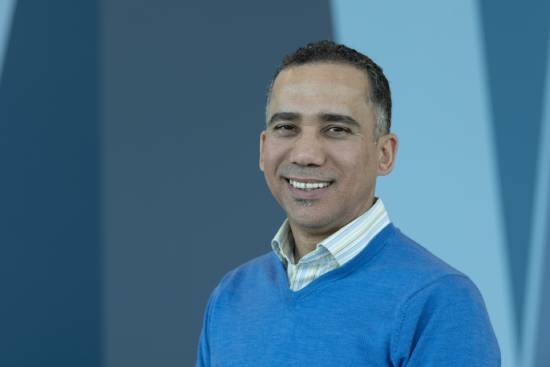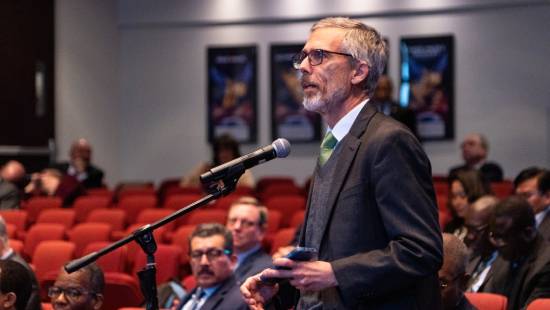The word “laity” comes from the Greek word laikos, which means “of the people.”1
In a general sense, a “layperson” would contrast with a professional or expert. This is why the phrase “in layman’s terms” exists, since professionals often use career-specific jargon when the rest of us just want a plainly worded explanation.
When labels like “laity” and “laypeople” are used in a church setting, it typically means those who don’t serve as “clergy,” or career pastors/priests and the like.2
But this means the laity is the body of believers who fill the pews, worship together, study together…so the laity is the church!
Looking back, Christianity’s roots are with the laity. It wasn’t priests or religious scholars who first spread the Gospel to the world. It was a growing group of ordinary people—fishermen, tax collectors, tentmakers, etc.
As it’s always been, church members are connected with the larger community through proximity, profession, and recreation in ways clergy aren’t able to be. They can reflect Christ’s character through their day-to-day interactions, so they naturally end up with more opportunities to share their faith with those who might the otherwise visit a church on their own.
But even so, how often do we really consider the significance of the everyday church member?
Jesus Christ has a high calling for everyone in His church, regardless of position. Let’s learn more about:
- The role and authority of Adventist church members (laypeople)
- How laypeople can serve and make a difference
- The significance of the laity in the Bible
- How the church can empower the laity
Let’s start by looking more closely at the role church members have in the Seventh-day Adventist denomination.
The role of laypeople in the Adventist church
 Similar to the general use of “professional vs. layperson” and “clergy vs. layperson” in a religious context, the Adventist Church considers all professional ministry leaders—those who have received the appropriate education and training and are officially employed by the Adventist Church—as clergy. And the membership of all congregations worldwide is the laity.
Similar to the general use of “professional vs. layperson” and “clergy vs. layperson” in a religious context, the Adventist Church considers all professional ministry leaders—those who have received the appropriate education and training and are officially employed by the Adventist Church—as clergy. And the membership of all congregations worldwide is the laity.
Clergy positions officially recognized by the General Conference of Seventh-day Adventists (world headquarters) include:
- Trained and employed pastors (regardless of ordination status)
- Bible workers
- Departmental directors/administrators in regional administrative offices
- Other various employed positions that involve spiritual leadership.3
In support of these clergy-level positions, Adventist laypeople occupy many vital volunteer leadership roles. This includes elders, deacons, committee chairs, Sabbath school teachers, and much more. While they’re considered lay leaders4 and can even be ordained in some cases, they don’t have the same administrative or legal authority as pastors in things like officiating marriages or being a senior pastor of a church.5
But that doesn’t diminish an individual’s spiritual authority because everyone has been given spiritual gifts that are essential to spreading the Gospel (1 Corinthians 12:4-19).
What type of authority can a layperson have?
All believers are given spiritual authority to teach, preach, disciple, and even baptize (Matthew 28:18-20).
When it comes to administrative authority within the Adventist denomination, that is reserved for those officially employed by the church.
Let’s look at baptism for an example. If a regular Christian meets someone who wants to be baptized, they’re free to baptize that person because that’s between them and God (Acts 8:30-38).
But if someone wanted to be baptized into the Adventist Church as a member, then the baptizer must be officially employed by the church.6
Similarly, anyone can preach, teach, or mentor disciples. But only an official church employee can run a program that’s authorized to represent the denomination as an organization. Church members or other speakers may also need permission from their church leaders to preach to a congregation.7
Overall, however, we uphold the way Jesus is our high priest among a priesthood of believers. He’s our ultimate authority. We’re all accountable to Him (1 Peter 4:5; Colossians 1:15-18). And Adventist Church leaders are held to a high standard of biblical accountability because they’re expected to guide and mentor those entrusted to their care (James 3:1; Romans 2:17-24; 1 Peter 5:1-4). It’s important for them to understand the kind of influence and responsibility that comes with that.
That’s why prophets in the Bible were often called upon to advise kings, priests, judges, etc., and keep them accountable. If they didn’t, the leaders’ actions could have a significant negative impact on their entire constituency(Jeremiah 26:1-7; Matthew 3:7-10; Mark 6:17-18).
A well-known example of this is Nathan, who advised King David and also called him out when his selfish actions affected his character, his faith, and the lives of innocent people (2 Samuel 7:1-17; 2:1-15).
It’s important for church members to look after their leaders just as their leaders look after them (Hebrews 13:7, 17). It’s like a system of checks and balances. While pastors and elders are called to care for the spiritual well-being of their congregation, laypeople can support, uphold, and respect their leaders while also seeking biblically-based ways to provide feedback and hold them accountable.
“And we urge you, brethren, to recognize those who labor among you, and are over you in the Lord and admonish you, and to esteem them very highly in love for their work’s sake. Be at peace among yourselves” (1 Thessalonians 5:12-13, NKJV).
Scripture lists the qualifications for church leaders like pastors, elders, and deacons (1 Timothy 3:1-13; Titus 1:5-9), and we can hold our leaders accountable to those. But it’s important to remember we all ultimately answer to Jesus, who knows everyone’s hearts (Hebrews 4:12-14; 2 Timothy 2:15, 19).
Now let’s explore some additional ways an Adventist layperson can help accomplish the mission of the worldwide church.
Democratic authority of an Adventist layperson
 Aside from occupying volunteer positions that have their own circles of authority or responsibility, laypeople in the Adventist Church are given opportunities to serve as delegates at regional meetings and vote on decisions that impact the church, keeping it informed, healthy, and growing. It’s one big way that the laity helps keep church leadership accountable.8
Aside from occupying volunteer positions that have their own circles of authority or responsibility, laypeople in the Adventist Church are given opportunities to serve as delegates at regional meetings and vote on decisions that impact the church, keeping it informed, healthy, and growing. It’s one big way that the laity helps keep church leadership accountable.8
The Adventist Church is divided into administrative categories:
- Local church congregations
- Conferences
- Union conferences
- Divisions
- General Conference, the denomination’s world headquarters
At the local church level, aside from weekly worship services and church activities, members can attend business meetings and join ministry teams or committees, like the nominating committee, to elect members to serve in various lay leadership roles.
At conference offices and unions conferences, members can serve as delegates—representatives who vote on behalf of their congregations—at constituency sessions.
Laypeople can also serve as delegates at General Conference Sessions every five years, where both church leaders and members from all over the world meet to listen to current issues, participate in moderated discussion, and vote.
Find ways to serve as a layperson
Here are several ideas for how everyday Christians can be involved in ministry and leadership. We’ll break them into the following categories:
- Lay leadership
- Mission outreach
- Media ministries
- Using their profession to represent Christ
Lay leadership
Along with elders and deacons, lay leaders can be:
- Administrative/clerical staff
- Sabbath school teachers
- Worship service leaders
Specific ministry leaders (for youth, prayer, and community services, etc.).
Mission outreach
“Missionary” is a broad term that can apply to local, national, or international outreach. If anyone wants to volunteer to be a missionary for the Adventist Church, whether on a single trip or for long-term placements, there are training opportunities and programs to help make that happen. Here are some examples of how missionaries can serve others and share the Gospel:
- Event speakers
- Bible study leaders
- Mentors
- Colporteurs
- Professional/trade support
- Medical professionals and assistants
- Teachers
- Caregivers
- Translators
- Online/digital mission work
Let’s expand on the ministry opportunities using digital methods.
Media ministries
TV and radio ministries were popular methods of missionary ministry for a long time. Under the leadership of a trained evangelist or a team of pastors, they helped reach out to people around the world without the many costs and limits of in-person or local ministry.
Now it’s even easier to serve in this capacity and reach people we may never otherwise cross paths with. We can use websites, blogs, videos, podcasts, livestreams, and various social media platforms to share biblical content and engage in loving discourse during a time when compassion, understanding, belonging, integrity, and truth are hard to come by.
For any layperson wanting to share the Gospel digitally, it could be as simple as sharing a Bible verse or responding to a comment. Or it could be getting involved with an official Adventist ministry online.
Social media has also opened opportunities for creatives like writers, filmmakers, artists, and musicians to share the Gospel through their work. Some with skills in search engine optimization may analyze the internet’s algorithms to maximize their efforts in reaching as many interested people as possible.
It’s just as evident today that serving God doesn’t require you to have a religious profession.
Even if we don’t participate in organized religious activities, we can still serve God every day as we go about our regular responsibilities.
“Tentmaking”—our day-to-day ministry opportunities
Because of the apostle Paul’s trade skills that supported him during his travels and ministry, it’s common to hear the term “tentmaking” refer to someone’s career or profession.9 He worked with fellow tentmakers Aquila and Priscilla (Acts 18:1-3). They became close friends with Paul and even helped the evangelist Apollos understand and preach the Gospel more accurately (Acts 18:18; Romans 16:3-4).
No matter what type of skills or training we have, we can all be “tentmakers” because it’s about reflecting Christ’s character in everyday interactions with coworkers, customers, business partners, etc.
These opportunities could come about within collaborations, normal interpersonal interactions, or simply by maintaining care and integrity in our work ethic and daily attitude (Colossians 3:24).
And while professional relationships and interactions can bring all sorts of opportunities to demonstrate Christian principles, we can also remember that whether we’re clergy or laypeople, we can also reflect Christ in our hobbies, our neighborhoods, or when running errands.
And we still haven’t covered all bases! Any Christian can serve in countless ways. The Bible is filled with examples of ordinary people who made a far-reaching impact for God.
Influential laypeople in the Bible
While you won’t find words like “clergy” and “laity” in the Bible, there’s a distinction between certain leaders and everyone else.
So many leaders or prophets started out as regular folks doing regular, unremarkable things. Some had influence in secular areas, but were far from any type of trained clergy.
For example:
Throughout Biblical history, God called ordinary people to do the extraordinary.
The Old Testament
When the Israelites were established as a nation in the Old Testament, God chose the tribe of Levi to serve as priests and conduct temple proceedings. They performed the sacrifices, led the people through the feast days, and ministered before God’s presence (Numbers 3:5-10; 1 Chronicles 6:48-49).
The Levites who weren’t priests served as guards, supply managers for the sanctuary, and musicians (1 Chronicles 9:17-33; 15:16).
The authority of priests wasn’t to be questioned because God made it clear that He chose them. In Numbers 16-17, a group of men were punished for rebelling against Moses and Aaron’s leadership. Then the Lord reaffirmed Aaron’s authority as Israel’s high priest by miraculously making his rod bud almond blossoms.
But the priesthood by no means lessened the significance of the ordinary person. Here are some more figures from the Bible who God called to serve Him in incredible ways, regardless of their background, status, or identity:
- The forefathers of Israel—Abraham, Isaac, and Jacob—were nomads (Hebrews 11:8-10).
- Joseph was a shepherd, then an outcast from his family, then a slave—then he became a steward for a government official, then a prisoner, then an advisor to the Pharaoh who essentially
- made him like a prime minister of Egypt (Genesis 37, 39).
- Moses and David were shepherds before they led the Israelites (Exodus 3:1; 1 Samuel 16:19; 17:34).
- Bezalel and Aholiab were artisans chosen to make the sanctuary’s furniture and fabric (Exodus 31:1-11).
- Gideon was a regular guy who was threshing wheat when the “angel of the Lord” appeared to him. Then he led Israel through battle (Judges 6:15-16).
- Queen Esther was an orphan who was selected to be trained at the palace (Esther 2:5-18).
- Elisha was plowing fields before he was called to be a prophet (1 Kings 19:19).
- Nehemiah served the King of Persia as a cupbearer (Nehemiah 2:1).
- Ezra was a scribe (Nehemiah 8:13).
- Amos looked after ship and cultivated sycamore trees (Amos 7:14).
- A slave helped her master heal from leprosy (2 Kings 5:2-4; 14-15).
- Daniel worked as an administrator within a secular government structure (Daniel 1:19; 2:48; 6:1-2).
When God chose someone for a purpose, He equipped them for whatever challenge they faced.
And Jesus continued to do this during His earthly ministry as He began to change the system, choosing (who we might consider to be) unlikely people as ambassadors for the Kingdom of God.
The New Testament
In the New Testament, spiritual authority was given to all of God’s people, as evident by the outpouring of the Holy Spirit.10 This occurred when Jesus fulfilled His earthly mission and became our heavenly high priest (Hebrews 9:11-15).
Although appointed leaders helped manage the growing church, laypeople kept it running. They worked with the primary church leaders— apostles, prophets, and teachers—to spread the Gospel and disciple others. Those who weren’t in leadership positions had other gifts.
“And God has appointed in the church first apostles, second prophets, third teachers, then miracles, then gifts of healing, helping, administrating, and various kinds of tongues” (1 Corinthians 12:28, ESV).
“And He Himself gave some to be apostles, some prophets, some evangelists, some pastors and teachers, to equip the saints for the work of ministry, to build up the body of Christ” (Ephesians 4:11-12, CSB).
An example of laypeople and church leaders working together is when the twelve apostles ordained seven deacons to help in the community. This allowed the leaders to focus on prayer and God’s Word (Acts 6:1-7).
Other Christians worked with Paul during his missionary travels.11 Among these were Luke the physician (Colossians 4:14), a former servant named Onesimus (Philemon 1:10-16), and Tertius, who transcribed the book of Romans (Romans 16:22).
The church as a whole makes up the new priesthood. When Jesus died on the cross, the temple veil was torn from top to bottom, indicating an end to the need for the temple sacrificial system.12 The role of the priest and intercessor was no longer reserved only for a select group, but for all who came to Christ and were willing to serve.
Jesus is now the high priest of His people, and He has made all His followers spiritual priests (1 Peter 2:9; Revelation 5:9-10). And just like the high priest who had the most spiritual authority, Christ is the global church’s ultimate authority (Hebrews 5:1-5, 9-10).
Every Christian is significant and has a purpose to fulfill in this priesthood of believers.
What if I’m not sure yet how to serve? Do I need to become a pastor if I want to lead people to Christ?
First off, let’s remember that the reason for clergy at all is to serve and empower the laypeople (Acts 20:28).
Christians, whether they’re on the membership books for a specific denomination or not, can know that God has gifted them with the Holy Spirit, and He has a purpose for them.
Throughout history and in many ways today, being a member of the clergy can come with a varying degree of respect and prestige. This has led some to assume that most of a church’s ministry, influence, and leadership happens among clergy. But even if that were the case…what would the clergy be without those who attend services, participate in corporate worship, contribute tithes and offerings, and carry out daily ministry that spreads the Gospel to the rest of the community?
The church is not a church without the laity. Every member of the body of Christ is the whole reason the church exists (Ephesians 2:10; 1 Corinthians 12:20-27).
To help people get started in ministry of any kind, there are assessments and training that can help church members discover their spiritual gifts and learn how to use them to share their faith.
People with a knack for teaching could be trained to lead Bible studies or Sabbath school classes. Those who are into health and nutrition can be given opportunities to lead cooking classes and share healthy recipes with the community. People who are good with numbers could serve as church treasurers. Those who enjoy a certain hobby, sport, or skill could lead an interest-based ministry group.
Some denominational organizations, such as Adventist-laymen’s Services and Industries (ASI), support people who want to use their skills for the mission of the church.
The worldwide body of believers has been built throughout the ages by regular people. Its foundation began with Jesus, who lived as a carpenter and traveling preacher. His followers, who made a huge difference in the world, came from all kinds of backgrounds.
They may have different roles from pastors and other leaders. But God values and ordains all people for good works (Ephesians 2:10).
- “Laity,” Online Etymology Dictionary. [↵]
- “Clergy,” The American Heritage Dictionary of the English Language. [↵]
- The Seventh-day Adventist Church Manual, pp. 36-37, [↵]
- “Pastor’s Pastor: Recruiting laity leaders,” Ministry Magazine (June 1999). [↵]
- Church Manual, pp.80, 82, 84-85. [↵]
- In some cases, a pastor or conference president may commission an elder (lay leader) to arrange a baptismal service if a local pastor is unavailable. (Church Manual, p. 80.) [↵]
- Church Manual, p. 126. [↵]
- Church Manual, pp. 116-121. [↵]
- Trecartin, Homer. “Seven principles of being a Tentmaker,” Ministry Magazine (May 2021). [↵]
- Acts 2:2-4, 15-18; 4:31; 8:14-17; 10:44-47; 19:1-7 [↵]
- Acts 13:1-5; Romans 16:1-16, 21-23; Colossians 4:7-14 [↵]
- Matthew 27:50-51; 10:8-10, 19-21 [↵]
More Answers
Adventist Education
Seventh-day Adventists have historically upheld the importance of a well-rounded, high-quality education. Instead of a one-size-fits-all approach to teaching and learning, the Adventist Education system operates on the principle of educating the “whole” person.
Evangelism
Evangelism is simply sharing the truths of the Bible with someone else. And Adventists are all into it.
Everything You Need to Know About an Adventist Church Potluck
Every so often, usually on a schedule ranging from once a week to once a month to once a quarter, an Adventist church will have “fellowship dinners,” often casually referred to as potlucks.
The Seventh-day Adventist Hymnal
The Seventh-day Adventist Hymnal is a songbook used worldwide by many Adventist congregations during their worship services. Since its publication in 1985, it has helped foster praise to God while reminding church members of our mission and drawing them closer to Jesus.
What Are Seventh-Day Adventist Sermons Like?
In nearly every Seventh-day Adventist Church, the sermon is the focal point of the main service—similar to many Protestant Christian denominations. It is a time of biblical instruction by the pastor, who shares what they’ve been studying in the Bible and preparing over the previous week.
Who Are Adventists
The Seventh-day Adventist Church—“Adventists” for short—is a Christian denomination of ordinary people who seek to follow Jesus and live out His mission in this world. Established in 1863, we hold to the Protestant principle of sola scriptura, which means the Bible guides everything we do.
Why is the Great Controversy in my mailbox?
Every year, households across North America receive free copies of a 150-year-old book, The Great Controversy. Millions more are shared around the world.
How do Adventists choose what to eat?
Food blogs overwhelm the internet; food fads are all the rage; and copycat and healthy versions of food are the subject of many a get-together.










